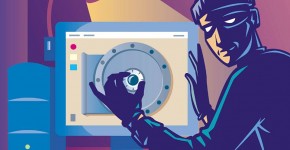Hacking might be a plague or a blessing in disguise, leading to better code and an ultimately safer Internet experience. But, especially with regular users thinking themselves inconsequential to hackers and being unaware they should even care enough to opt into a two-factor authentication system – the threat posed by hacking now to our privacy online is something netizens can’t afford to take lightly.
The Pros and Prognostics of Seeking Privacy Online
There are those who’ve tried to equate our Internet routines with psychological tells: presumably, if you like uploading clips of yourself on YouTube, you’re an extrovert, while, your obsessive use of emails and instant messaging (instead of physical interaction) can be a symptom of someone prone to depression. Having said that, there are some online practices that shouldn’t be construed as anything more than what they are at face value. For instance, if I want to hide my IP address, it doesn’t mean I’m paranoid, it’s only indicative of a healthy dose of concern about being tracked by the powers that be.
How is that healthy and not a sign of apophenia, you ask? To answer that, we don’t need to look any further than the NSA scandal, or the more recently surfaced revelation about the FBI’s use of smartphone hacking to record suspects’ conversations. The list goes on, chock-full of proof that privacy online is quickly becoming a luxury commodity that we should hold onto for dear life. And not because our Internet behavior might reveal any dirty little secrets about us, but because the continued free, unfettered surfing on the world wide web depends on preventing random hacking from becoming the norm.
Hacking Highlights and Steps Taken to Address It
Malware-induced hacking was once grabbing global headlines – now, though, it’s relegated to the back pages, as more and more cyber-attacks have desensitized us to its implications. If we weren’t laughing out loud at the The Syrian Electronic Army’s hijacking of high-profile Twitter accounts like The Onion, CBS, E! Online and, now, Thomson Reuters, we were certainly inured to it. Developing a thicker skin in this case is not necessarily a good thing.
For most of us, it’s clear that the continuing availability of the Internet as an at-your-fingertips source of fun and information is predicated on these kinds of breaches remaining the odd, newsworthy exception. However, there are others whose abuse of the Net – even when occurring under the cover of a Guy Fawkes mask and the pretense of doling out justice – is impinging on all of our experience. Earlier this year, for instance, when the spam-filtering company Spamhaus came under a distributed denial-of-service siege, the domino effect crippled the entire Internet with slower speeds and broken connections.
While there’s still no surefire way of protecting oneself against hackers, victims of hacking do have some means of retaliation at their disposal. For one, there’s hacking back – which might result in collateral victims or, when it indeed hits the mark, fuel cyber-retaliation, not to mention it’s just as illegal as the initial attack. Then, there are ethical hackers, the use of whose services might indeed help shield you from future threats, but is largely a preventive measure.
Indeed, the more intel we get from hackers themselves through their crimes, the more we understand their modus operandi, the better – but, whether the holes in security systems are patched up or not, the there’s no telling what bigger, badder malware will come knocking next time.




